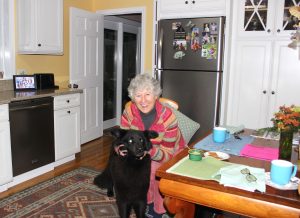For most people, there’s no bigger fear in life than that of death or dying. It’s the unavoidable end that looms over all of us, growing stronger as we age.
So it’s unsurprising that we find it so hard to talk about the topic. We think of conversations around death as heavy and depressing and mostly shy away from talking about the subject at all.
But not Marion resident Madeline Cooke.
Cooke, 74, wants to bring light to the topic of death and hopes she can convince others to do so too.
“You can get very close to somebody very quickly (talking about death) and I really like that,” she said. “It’s authentic. It’s real. I mean it’s the best common denominator I can imagine because we’re all going to die and we’re all going to know somebody, and maybe be a part of, somebody’s dying journey.”
A hospice volunteer and certified “death doula,” Cooke has some experience helping those who are dying. But that’s not what she’s looking to do here.
She’s not sure when her interest in sharing stories about death started, but she said, something sparked when a friend told her about the existence of death cafés, a new type of public gathering that began in Europe almost 15 years ago. Cafés were set up in England initially with general guiding principles that included having no agenda or message, creating a respectful space, and pairing the conversation with tea and cake.
The cafés brought people, often strangers, together to make the most out of living by talking about death.
Cooke thought it looked like fun and decided to open her home to friends to create her own Death Café. She served tea and cake in what became a regular meeting group. The meetings showed her that conversation on death didn’t have to be dark or heavy, she said.
“I thought why don’t we talk about real deep subjects like death and dying, instead of all the fluff stuff,” she said. “So I brought some friends together and we would just do tea and cake.”
One conversation in particular brought home the possibility of finding lightness in sharing stories around the end of life.
A neighbor told a powerful story about a near death experience that took away his fear of dying. It had such an impact, he told Cooke clearly to share his story with others.
“He went to get his annual physical and they said, ‘Oh, there’s a heart murmur; we better check this out,” she said, retelling the story as she heard it. “They opened him up and it turns out it was a valve. They took his heart out and put it on the table – these are his words…- and put in a pig’s valve.”
All was good, Cooke said, until the next day.
“The next morning he got up…and slowly tried to walk down the hall with help from nurses on either side of him. Suddenly he just saw white, total white, peaceful, calm, quiet. And he said it like that, ‘Quiet.’”
“His whole face lit up when he told me how he loved the white, everything was ‘White,’” she continued. “And then they used the paddles (to revive him), and he was cross, and said, ‘Why’d you do that?’ to them.”
Cooke said she’s not sure if the statement was word for word what her neighbor said to medical staff when he woke up, but his reluctance at leaving the white space was clear. He is fine now, she said, and still active, but his feelings about death have changed.
“He said, ‘I’m not afraid to die.’ And he leaned in and said (it again), ‘I’m not afraid to die.’”
Cooke believes there are many people out there with equally powerful stories about death. She doesn’t mean the near-death experience specifically, just their own personal experiences and stories.
“I mean that everybody has a story or many stories and ones that aren’t doom and gloom. That are fascinating stories,” she said. “I think it’s just fascinating to hear them.”
So many people carry stories about dying and death that Cooke decided to host a public event to enjoy tea and cake and talk about death. The event, her first public Death Tea Party, was held last month at the Marion Council on Aging with 15 people attending.
She set it up following Death Café guidelines, especially not having an agenda and being clear the event was not meant to be a grief support group. They’re both important to a positive experience, Cooke said, but the second one in particular keeps the conversation from getting too heavy.
Cooke, who plans to hold more Death Tea Parties, said the conversation began with topics that felt comfortable to attendees.
“It’s pretty strange in this time and place to even use the word death, so it was comfortable for people to share stories of funerals when families came together to find that humor was restorative or that the ashes remain important to them,” she said. “There were some laughs as well over an unusual method of spreading the ashes.”
And, she said, “On a more serious note was the telling of having been given last rites three times.”


Recent Comments